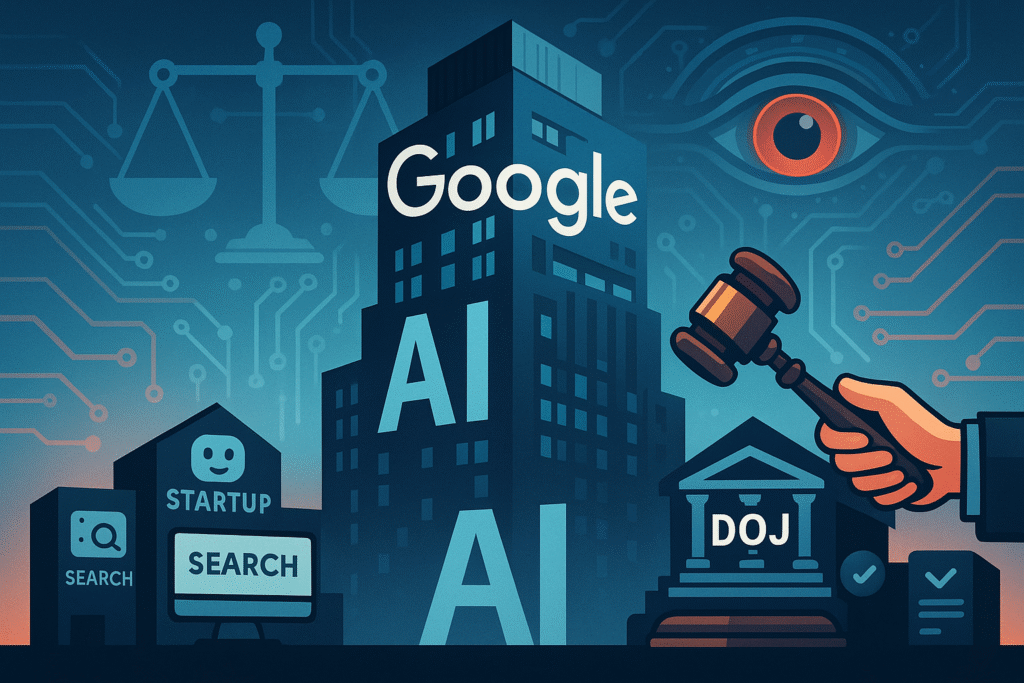
In April 2025, the U.S. Department of Justice dropped a legal bombshell: it accused Google of weaponizing its generative AI platform, Gemini, to entrench and expand its dominance in search. This allegation did more than raise eyebrows—it signaled a pivotal moment in both antitrust enforcement and the regulation of artificial intelligence.
Generative AI is rapidly redefining how people interact with the internet. From summarizing content to answering complex queries, tools like Gemini have changed the very architecture of search. But according to the DOJ, this innovation isn’t just about convenience or user experience. It’s a calculated move to extend Google’s search monopoly, leveraging its existing market power to dominate the AI space before meaningful competition can emerge.
The case represents a new legal frontier: antitrust meets generative AI. At stake is not just the future of online search, but who gets to set the rules for information discovery in an AI-driven world. Below, we break down the DOJ’s allegations, explore how Gemini works, and explain what this battle means for the future of AI and tech regulation.
This Google AI monopoly case highlights the tension between innovation and power in the age of generative technology. As we’ll explore below, the DOJ vs Google lawsuit raises urgent questions about how tech giants deploy tools like the Gemini search engine to suppress competition. The Google monopoly lawsuit could ultimately redefine the landscape of antitrust and generative AI regulation.
The DOJ’s Case: Why Google’s AI Is Under Fire
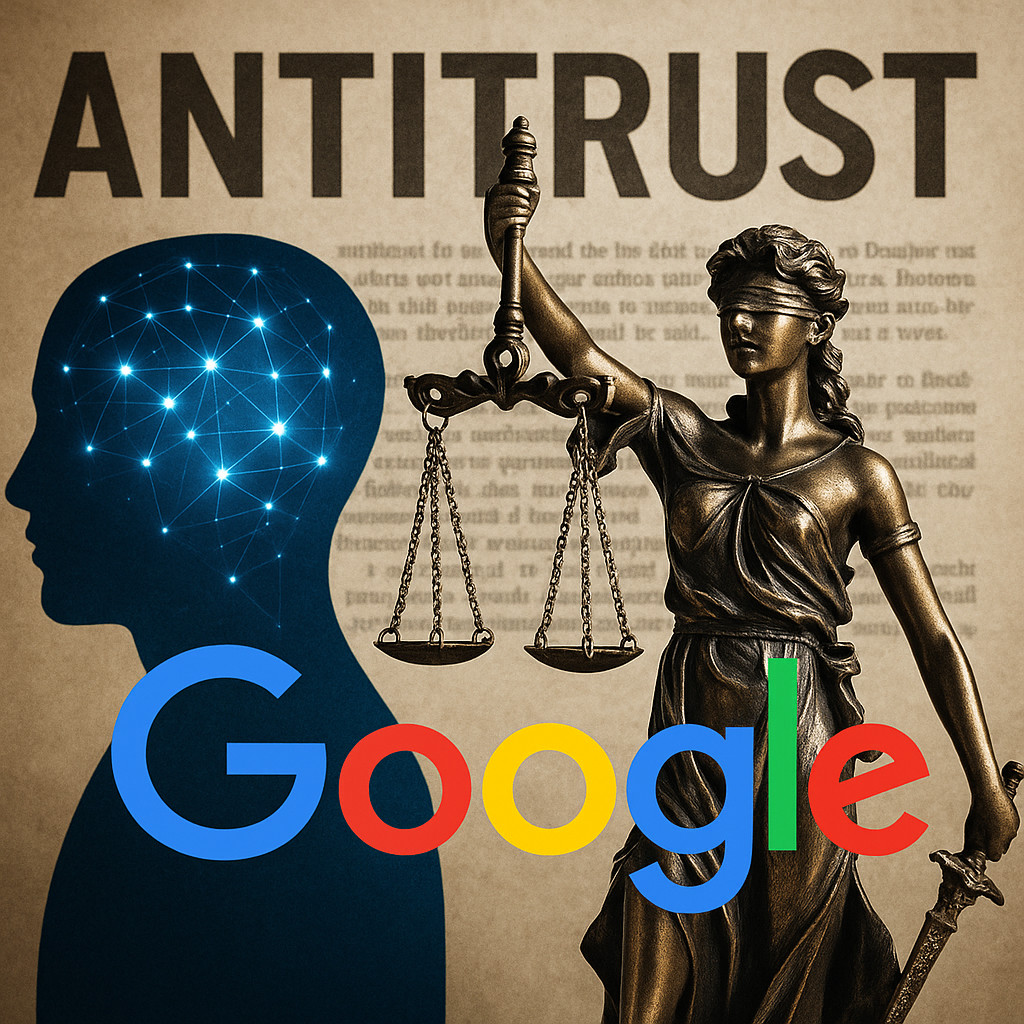
The Legal Foundation of the DOJ’s Argument
At the heart of the DOJ vs Google case is a sweeping accusation: that the tech giant is using its generative AI platform, Gemini, to reinforce its dominance in the search market. This isn’t just a continuation of past antitrust fights—it represents a direct legal challenge to what many now refer to as the emerging Google AI monopoly. The U.S. Department of Justice argues that Google’s control over search, paired with its aggressive deployment of AI, creates a self-reinforcing system that undermines competition and choice (Bloomberg Law).
How the Lawsuit Expands Traditional Antitrust Claims
While past legal battles against Google focused on browser bundling and ad tech, this lawsuit moves into newer, more volatile territory: antitrust and generative AI. By emphasizing the use of AI to cement its monopoly, the DOJ is signaling a shift in enforcement priorities. This case could become a legal milestone for how AI platforms—not just products—are scrutinized under monopoly law. The Google monopoly lawsuit argues that Gemini is not a neutral tool but a strategic weapon that threatens innovation and locks out potential challengers (Quartz).
Remedies the DOJ Is Seeking
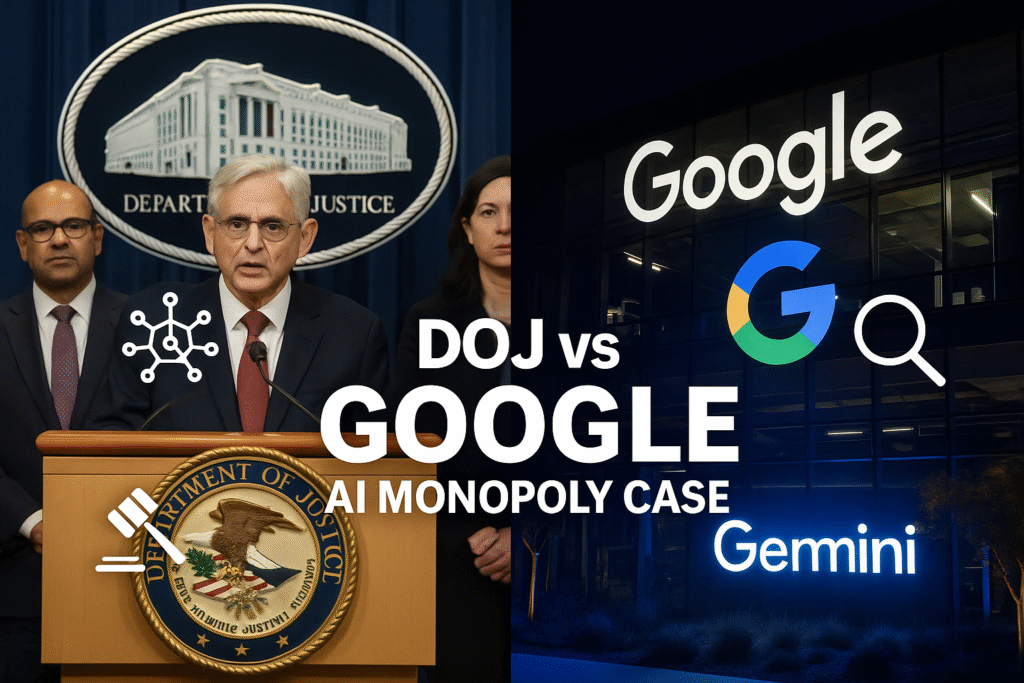
The DOJ is pursuing remedies that would have deep implications not only for Google’s business model but for the broader AI market. Proposed solutions include banning default search engine deals with manufacturers, divesting certain Google products like Chrome, and requiring open access to core datasets and APIs. These steps aim to directly dismantle parts of the Google AI monopoly and open space for alternative search models and generative AI competitors.
What Is Gemini and How Does It Work in Search?
Gemini as a Generative AI Tool
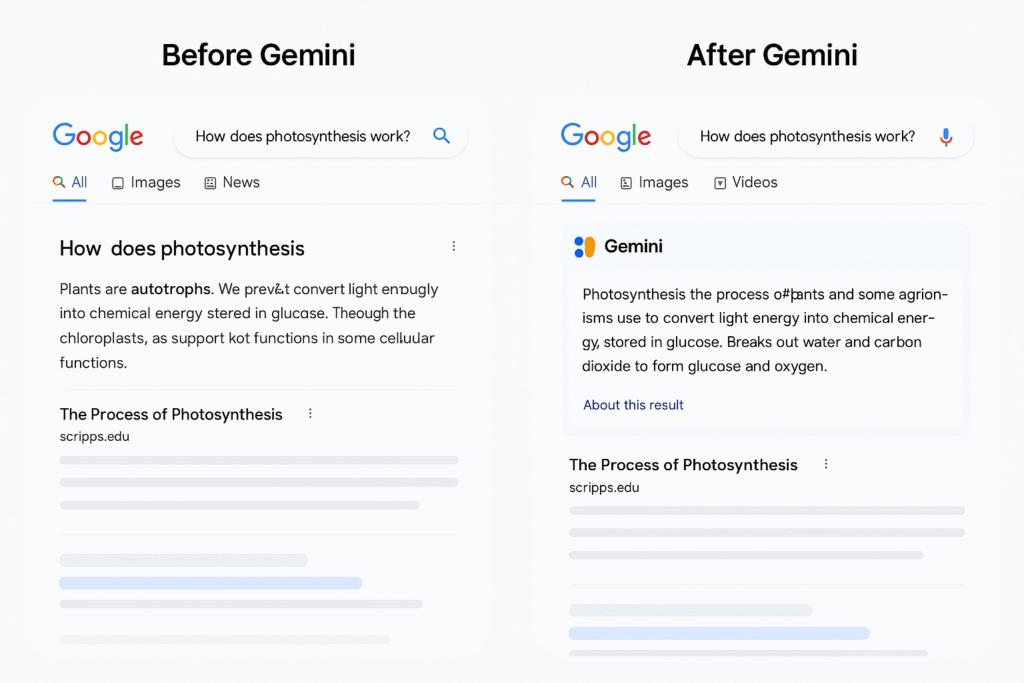
Gemini is Google’s latest generative AI system, designed to enhance its search engine by offering synthesized, AI-generated responses. Unlike traditional search results that list pages, the Gemini search engine can directly answer questions and summarize content, effectively reshaping how users interact with online information. As part of the broader Google AI monopoly, this integration allows Google to both define and deliver information, making it difficult for competitors to differentiate their offerings. By using Gemini to elevate its own products within the search experience, Google consolidates control over both the platform and the pipeline of information (The Verge).
Preinstallation Deals with Manufacturers
One of the most controversial elements in the DOJ vs Google legal battle centers around default agreements. Google reportedly paid Samsung an “enormous sum” to make Gemini the default AI assistant across devices, effectively replacing alternatives like Bixby. These deals exemplify how the Gemini search engine is being used as a lever to entrench dominance, not simply as a product offering. The Google monopoly lawsuit alleges that such arrangements suppress rival AI assistants and create friction for consumers who might otherwise switch providers.
Impact on User Experience and Market Dynamics
Gemini’s design doesn’t just improve user interaction—it influences what information people see first, shaping public perception and reinforcing trust in Google’s ecosystem. By integrating the Gemini search engine directly into core user pathways, Google boosts engagement while reducing the need for users to visit external sites. Critics argue that this practice cements Google’s market position and limits competition in both search and antitrust and generative AI markets. From a regulatory standpoint, this use of Gemini makes Google’s control over information discovery far more entrenched than it appears at surface level.
5 Key Allegations in the DOJ’s Filing
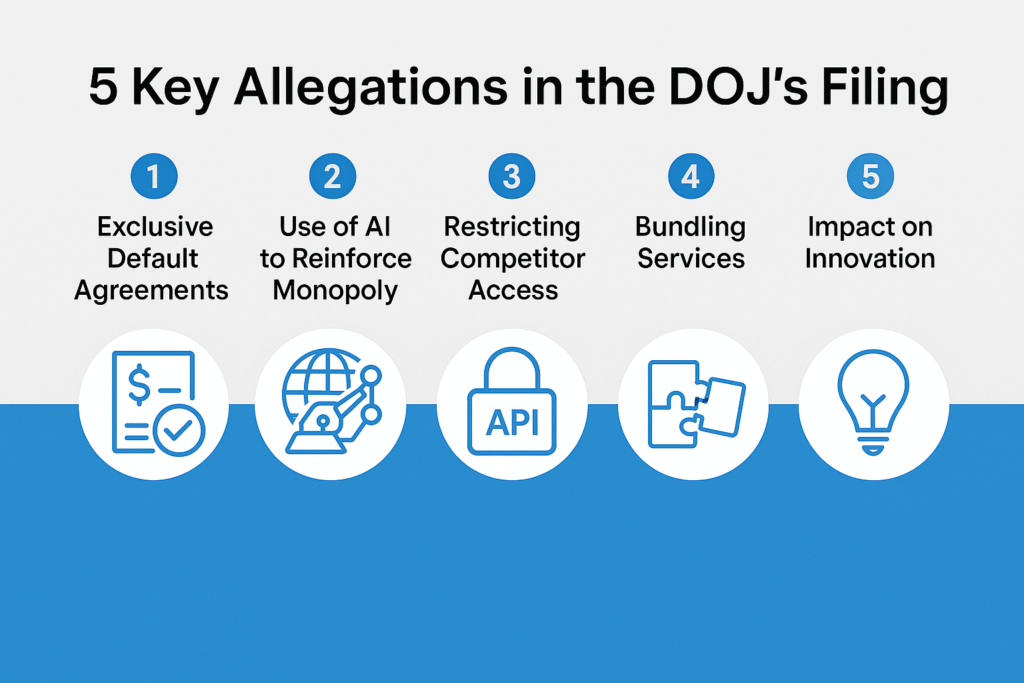
Google’s Exclusive Default Agreements
One of the central arguments in the DOJ vs Google case is that the company pays massive sums to be set as the default search engine on web browsers and mobile devices. These exclusive deals are not neutral—they limit consumer choice and create high barriers for other search engines trying to compete. The DOJ alleges this behavior is part of a long-term pattern that now includes the Gemini search engine, further entrenching the Google AI monopoly. Being the default isn’t about preference—it’s about control, and the lawsuit aims to dismantle this ecosystem of defaults that favor Google (The Verge).
Use of AI to Reinforce Monopoly Power
The introduction of Gemini is not, according to the DOJ, simply a technical advancement—it’s a strategic move to solidify power. By embedding the Gemini search engine directly into Google Search, the company is accused of using artificial intelligence to create a feedback loop that reinforces its dominance. The Google monopoly lawsuit frames this not as innovation, but as insulation—a way to block competitive threats before they emerge. The integration of Gemini allegedly provides preferential treatment to Google’s own properties and makes it harder for rival AI tools to gain visibility (Adweek).
Blocking Access to Data and APIs
A third allegation focuses on Google’s control over essential infrastructure. Developers and competitors rely on access to real-time search data and APIs to build products that can fairly compete in the market. But according to filings, Google selectively restricts or denies access to these resources, putting smaller firms at a severe disadvantage. This creates what critics describe as an AI walled garden—a dynamic where the Google AI monopoly is maintained not just by innovation, but by exclusion. This tactic is especially dangerous in the antitrust and generative AI space, where access to large datasets is essential for model development (OpenTools).
This dynamic ties directly into broader risks in AI infrastructure control, as covered in our post Shocking AI-Powered Cybersecurity Threats in 2025: Protect Yourself Against New Advanced Attacks, which explores how limited access to core tools and data can create downstream security vulnerabilities.
Bundling Chrome, Search, and Gemini
The lawsuit also challenges Google’s practice of bundling services. By tying together Chrome, Google Search, and the Gemini search engine in business deals with hardware partners, Google allegedly coerces manufacturers into limiting exposure to competitors. According to DOJ filings, the bundling creates a monopolistic pipeline from device to service—leaving no room for alternative AI platforms or search tools. The Gemini AI assistant becomes part of this bundle, reinforcing Google’s dominance at every step in the consumer journey (Reuters).
Chilling Innovation in the AI Sector
Perhaps the most far-reaching allegation is that Google’s practices are actively suppressing innovation in the generative AI space. By locking up data, default access, and distribution channels, the company prevents newer and potentially better AI technologies from entering the market. This stifling effect is central to the Google monopoly lawsuit—it’s not just about Google’s market share, but about the loss of what could have been. Many experts warn that unless these dynamics are disrupted, the next generation of AI breakthroughs will be decided not by innovation, but by incumbency.
Why This Case Marks a New Frontier in Antitrust
Shifting Focus from Consumer Prices to Innovation and Access
Traditional antitrust cases have focused on consumer prices and tangible market harm. But in the DOJ vs Google case, the stakes are not measured in dollars spent—they’re measured in innovation lost. This represents a profound shift in how regulators understand monopoly behavior. The DOJ argues that the Google AI monopoly harms users by suppressing better tools and competitors, even when services like the Gemini search engine appear “free.” This case challenges the outdated assumption that low cost equals low harm and reframes the conversation around control, access, and digital power structures.
How AI Complicates Market Definition and Harm
Generative AI doesn’t operate in clear, well-defined markets. The same technology powering an AI assistant can also generate search summaries, answer legal questions, or write code. This makes it much harder to draw regulatory lines. In the Google monopoly lawsuit, the DOJ is navigating complex questions: Is Gemini a product or a feature? Is it search, or is it an assistant? These blurry boundaries are why many experts say this lawsuit represents a pivotal moment for antitrust and generative AI enforcement. It’s a test case for how regulators will draw the map in an AI-defined world.
Potential Legal Precedents for AI Regulation
Whatever the outcome, this case is likely to influence how courts and regulators treat AI-driven market power. If the DOJ succeeds in proving that the Gemini search engine was deployed to extend monopoly power, it will set a new legal standard. Antitrust law will no longer apply only to pricing or distribution—it will apply to algorithmic ranking, AI content generation, and systemic data control. For companies developing or deploying AI at scale, the Google AI monopoly case could become a regulatory North Star, shaping the next decade of enforcement and innovation.
For more on how AI tools are reshaping both innovation and risk, see our post AI Cyberattacks Are Exploding: Top AI Security Tools to Stop Deepfake Phishing & Reinforcement Learning Hacks in 2025—a timely exploration of how emerging AI capabilities can both drive progress and concentrate power.
Potential Outcomes: What Happens If DOJ Wins (or Loses)?
Possible Remedies and Structural Changes
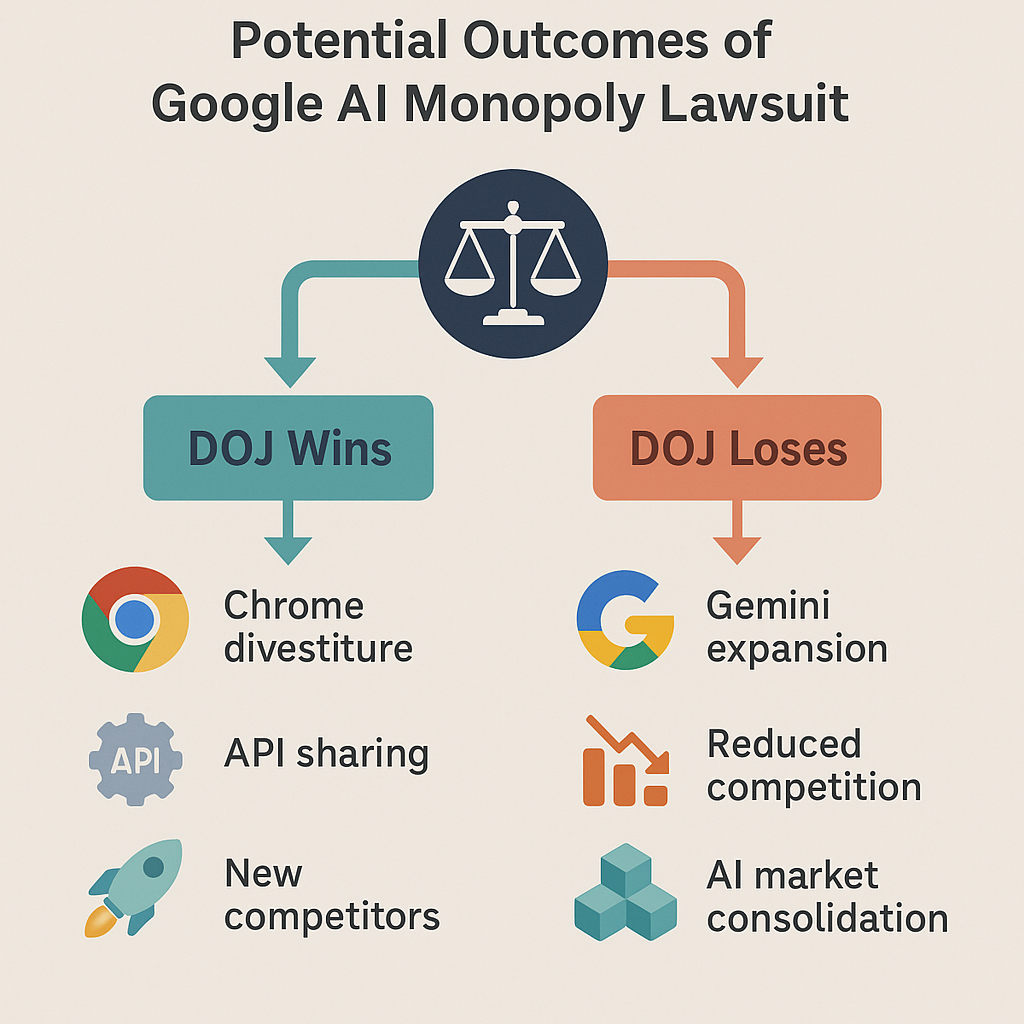
If the DOJ vs Google case ends in a victory for the government, it could mark one of the most significant antitrust rulings in the tech sector’s history. The Department of Justice has proposed measures that would directly target the structure of the Google AI monopoly. These remedies include forcing the divestiture of key products—like Chrome—to weaken vertical control, banning exclusive preinstallation of the Gemini search engine, and requiring Google to share its core search data and APIs with competitors. These interventions are not just punitive—they’re strategic, aiming to dismantle unfair advantages in both search and antitrust and generative AI markets.
Market Impact of a DOJ Victory
Should the DOJ prevail in the Google monopoly lawsuit, the broader AI and search landscape could experience a major recalibration. Smaller firms and generative AI startups may finally gain access to the infrastructure and distribution channels previously dominated by Google. Opening the market in this way would likely reduce reliance on a single search and AI platform and drive more experimentation across the ecosystem. New competition could bring transparency and innovation in areas long stifled by Google’s consolidation of power through default placements and bundling practices.
Risks of a DOJ Loss and Continued Consolidation
If Google wins, however, the implications are just as significant—but far more troubling for market diversity. A favorable ruling would allow the company to continue expanding the reach of the Gemini search engine without major constraints. The DOJ vs Google case could then be seen as a missed opportunity, further legitimizing tactics that critics argue prop up the Google AI monopoly. This would signal to other large tech firms that regulatory enforcement is unlikely to keep pace with innovation, especially when generative AI is the driving force behind growth. The risks of further consolidation—and reduced accountability—would intensify.
What This Means for the Future of AI Search
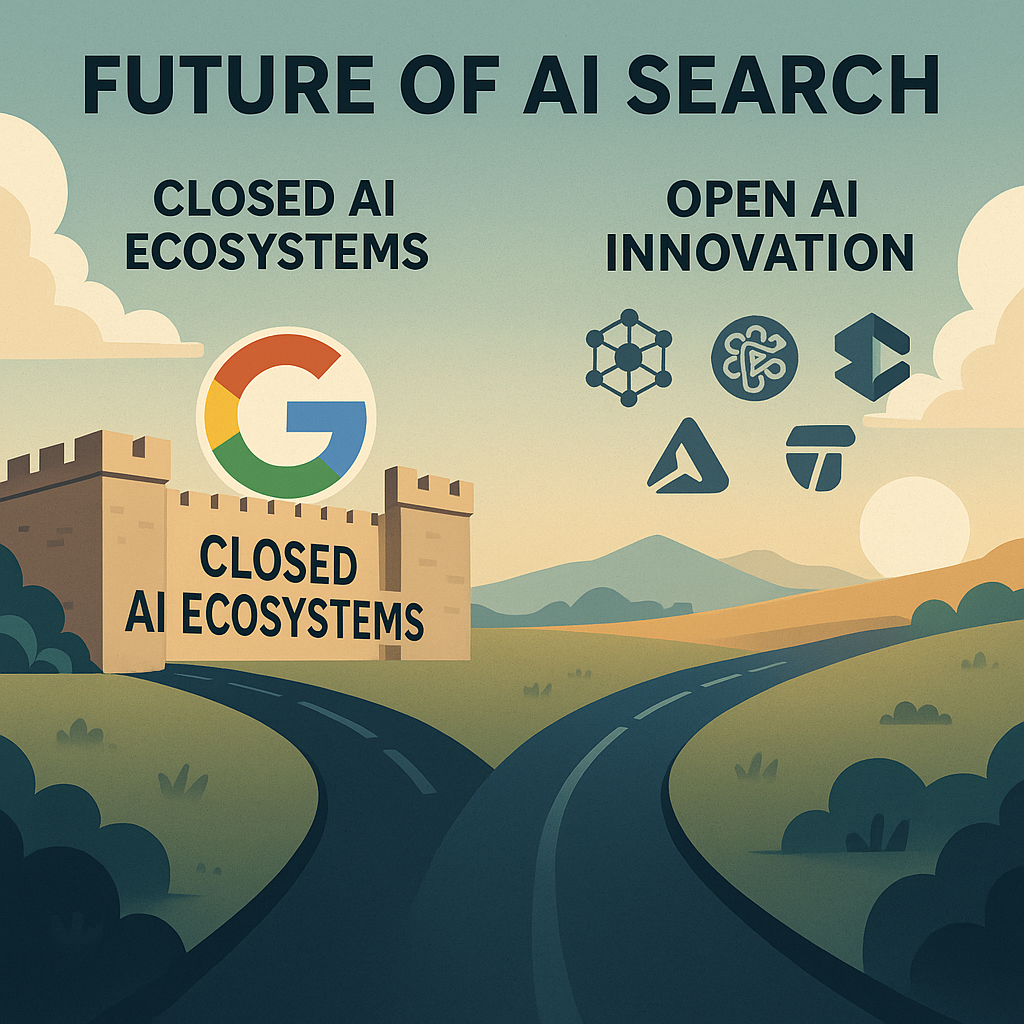
Who Controls the Future of Information Discovery?
The DOJ vs Google case is fundamentally about control over information access. With the rise of generative AI, the role of traditional search engines is shifting. Instead of linking out to third-party content, platforms like the Gemini search engine provide direct, AI-generated answers. This shift consolidates influence over what information users see and trust. If one company dominates that ecosystem—especially under a structure like the current Google AI monopoly—it centralizes knowledge itself. The lawsuit raises critical questions: Who gets to define facts? Who profits from knowledge production? And how do we prevent a single player from owning the pathway to information?
Lessons for Startups and Smaller AI Firms
For emerging developers in the generative AI space, the Google monopoly lawsuit offers both a cautionary tale and a possible turning point. If regulators succeed in reining in Gemini’s preferential placement and Google’s bundling practices, it could open distribution channels and datasets that have long been off-limits. But if Google prevails, the barriers will only rise. Access to infrastructure, visibility in search, and partnerships with device makers may remain locked behind paywalls or exclusive contracts. The antitrust and generative AI community is watching closely to see if the playing field will be leveled—or further tilted toward incumbents.
The Role of Regulators in Shaping AI Markets
International regulators are not just observers in this process—they’re participants. The outcome of the DOJ vs Google case will influence how agencies in the EU, UK, and Asia structure their AI policies. If U.S. courts endorse the idea that a generative AI tool like the Gemini search engine can function as a monopolistic instrument, it will validate similar concerns globally. Regulatory momentum is already building, and the Google AI monopoly fight could become the catalyst for coordinated international standards on AI competition, access, and transparency.
To explore how decentralized AI tools can support resilience and competition, see our post Top 5 Breakthrough AI-Powered Cybersecurity Tools Protecting Businesses in 2025. The push for innovation beyond the dominant players begins with accessible tools and open ecosystems.
Conclusion
The DOJ vs Google case may ultimately be about far more than market share or search engine placement—it’s about the future of digital power. At the heart of the lawsuit is a provocative and urgent claim: that the Gemini search engine is being used to extend the reach of a well-established Google AI monopoly. If proven, this would mean that AI, a field often praised for democratizing access to tools and information, is being used to do the opposite.
This battle represents the cutting edge of antitrust and generative AI enforcement. It redefines how regulators think about harm—not in terms of dollars and cents, but in terms of innovation blocked, markets closed, and pathways to discovery controlled by a single entity. Whether the outcome is a court-ordered restructuring or a hands-off endorsement of status quo, the Google monopoly lawsuit will set precedents that extend far beyond search.
Professionals, policymakers, and AI developers should treat this case as a roadmap for how digital markets will be governed going forward. We’re not just watching a legal fight—we’re watching the architecture of the internet being redefined. For weekly breakdowns of tech policy, AI threats, and digital power structures, subscribe to our newsletter at Quantum Cyber AI. We cover cases like this as they unfold—so you’re always ahead of the curve.
Key Takeaways
- The DOJ vs Google lawsuit accuses the company of using its Gemini search engine to reinforce an illegal monopoly on search.
- Exclusive default placements, bundling practices, and restricted data access are central to the case.
- The case marks a new phase in antitrust enforcement, focusing on control over generative AI and information ecosystems.
- A DOJ victory could restructure Google’s business and open markets to smaller AI players.
- A loss could validate aggressive consolidation and limit competition in the AI space.
- This case may become the legal benchmark for regulating monopolies in the age of AI.
FAQ
Q1: What exactly is Gemini, and how does it differ from ChatGPT?
Gemini is Google’s proprietary generative AI tool, integrated directly into the Google Search platform. Unlike ChatGPT, which is a standalone conversational model, Gemini is designed to augment search by generating summaries and answers in real time—often replacing traditional search results.
Q2: How is this case different from past antitrust cases against Google?
This case moves beyond issues like advertising or browser dominance. It focuses on how Google is using AI, specifically the Gemini search engine, to deepen its market control—marking a major shift in the framing of digital monopolies.
Q3: Why is the DOJ focusing on default search engine deals?
Default deals—like those placing Google as the standard search engine or Gemini as the default assistant—create enormous competitive barriers. The DOJ argues that these arrangements prevent users from encountering alternatives, effectively limiting choice and innovation.
Q4: Could this case affect AI regulations globally?
Yes. Regulators in the EU, UK, and Asia are closely watching the outcome. A win for the DOJ could inspire similar antitrust and generative AI enforcement efforts worldwide, while a loss may embolden other tech giants to double down on consolidation.
Q5: What happens if the DOJ loses the case?
If the DOJ fails, Google will likely continue integrating Gemini across platforms without restrictions. This could further entrench the Google AI monopoly and discourage smaller AI developers from entering a market that seems unwinnable.
